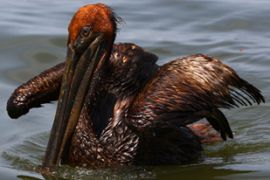‘Most oil from BP spill remains’
Researchers say 79% of leaked oil still in Gulf of Mexico, challenging government figure.

The report challenges a more optimistic assessment by the US government released on August 4, which said half the 4.1 million barrels of oil spilled by the April 20 blowout had been evaporated, burned, skimmed or dispersed.
At the time, Jane Lubchenco, head of the National Oceanic and Atmospheric Administration (NOAA), the agency that conducted the government report, told a White House briefing that: “At least 50 per cent of the oil that was released is now completely gone from the system. And most of the remainder is degrading rapidly or is being removed from the beaches.”
‘Misconception’
But Hopkinson told the AFP news agency that one major misconception was that oil that had dissolved into the water was gone, and therefore harmless.
“We just reanalysed this report … and then we calculated how much oil is still likely to be out there,” he said.
| in depth | |
|
“The oil is still out there and it will likely take years to completely degrade. We are still far from a complete understanding of what its impacts are.”
On Tuesday, a spokesman from NOAA defended the government report, saying the calculation was based “on direct measurements whenever possible and the best available scientific estimates where direct measurements were not possible”.
“Additionally, the government and independent scientists involved in the oil budget have been clear that oil and its remnants left in the water represent a potential threat, which is why we continue to rigorously monitor, test and assess short and long term ramifications,” Justin Kenney said in a statement.
Toxic oil levels
Separately, a study released by scientists from the University of South Florida said experiments in the northeastern Gulf revealed that oil in sediments of an underwater canyon was at levels toxic to critical marine organisms.
However, David Hollander, university oceanographer, stressed that the University of South Florida mission’s initial findings would need to be verified by more scientific testing.
For 87 days following the Deepwater Horizon rig explosion that triggered the oil spill, crude spewed into the Gulf, contaminating wetlands, fishing grounds and beaches from Louisiana to the Florida Panhandle.
BP engineers provisionally capped the leak on July 15 and are working to permanently “kill” the well later this month.
